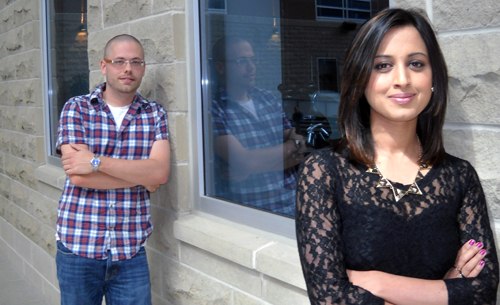
Do your genes mark you out for cancer, heart disease or diabetes? How might corn farmers grow more crops without wasting pollution-causing nitrogen? How to figure out which consumers prefer multigrain or whole wheat bread?
Ideas that might ultimately help to answer such real-life questions have earned top international honours for two young researchers in Guelph’s Department of Mathematics and Statistics. Jeff Andrews won this year’s Distinguished Dissertation Award from the Classification Society, and Sanjeena Dang received honourable mention.
They will discuss their research in statistical models and model-based learning at the society’s annual conference in Milwaukee this month.
Both completed doctorates in 2012 with Prof. Paul McNicholas and are now post-docs in the department.
“The awards are international recognition of the work we’re doing in classification,” says McNicholas. “They both worked on methods for analyzing bioinformatics data.”
Their studies are intended to improve stats tools and models used in making sense of lots of data. More and more, that information comes from biologists looking for help in interpreting their study findings, says Dang.
This summer, she will work on a genetics project with a master’s student in the Department of Human Health and Nutritional Sciences (HHNS). They will look at genetic mutations associated with fatty acid metabolism, a factor in heart disease.
Researchers collect information from the human genome to track down the effects of mutations in single genes in different people. Understanding statistics and computing – notably how to make sense of clusters of information – is a useful skill for biologists, says Dang.
“There is more interaction between biologists and computer scientists,” she says.
During her grad studies at U of G, she looked at livestock breeding models in Animal and Poultry Science and nutrigenomics data in HHNS. With researchers in Molecular and Cellular Biology (MCB), she has studied genetic data intended to help corn breeders develop plants that use nitrogen more efficiently, saving money for farmers and preventing nitrogen pollution of waterways.
Originally from Nepal, she completed an undergrad degree in biological sciences at Guelph. Along with MCB professors Mike Emes and Ian Tetlow, she studied how plants make starch.
Now she is co-advising another grad student back in Emes’s lab. Says McNicholas, “That’s a nice kind of evolution.”
Andrews has looked at statistical models and software to help with model-based clustering. His work can help in sorting through groups of consumers to zero in on who prefers, say, one kind of bread over another.
Multigrain, whole wheat or artisanal bread? Consumers weigh numerous factors in making choices – information that might help companies marketing various products, he says.
His work involves computing, including helping machines to group and analyze data. Human brains can distinguish among groups, but computers can conceivably do the same thing in numerous dimensions.
“I’m trying to make computers do what humans do well,” says Andrews, a keen competitor on the tennis courts at Cutten Fields.
His interest in clustering developed during his undergrad in mathematics and statistics at Acadia University. There he looked at medical compliance data, learning about why some patients follow a prescription drug regimen while others don’t.
“It’s a very hard problem, and hard problems are interesting.”
Along with McNicholas, Andrews has co-authored research papers, including four articles published in high-profile journals in his field.
He was attracted to Guelph for his master’s degree because of his supervisor’s work in clustering and classification. McNicholas holds the University Research Chair in computational statistics and is director of U of G master’s programs in bioinformatics.